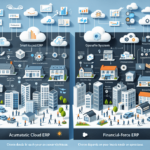Introduction to ERP and Its Importance
Enterprise Resource Planning (ERP) systems are essential for streamlining business operations and enhancing overall efficiency. An ERP solution integrates various business processes, including inventory management, sales, accounting, and human resources, into a unified system. By providing real-time data and analytics, ERP systems empower organizations to make informed decisions, improve productivity, and maintain a competitive edge in a dynamic marketplace. According to a Gartner report, the global ERP software market is expected to continue its steady growth, underscoring the critical role these systems play in modern business.
Epicor ERP vs. FinancialForce ERP: An Overview
Epicor ERP and FinancialForce ERP are two leading ERP solutions, each catering to different business needs and industries. Epicor ERP is renowned for its comprehensive features tailored for mid-sized to large enterprises, particularly in manufacturing, distribution, and supply chain management. In contrast, FinancialForce ERP is a cloud-based solution designed primarily for service-based businesses, offering robust project management and financial capabilities. This article delves into the key differences and similarities between these two systems to help businesses determine which ERP solution best aligns with their operational requirements.
Features and Functionalities
Epicor ERP
Epicor ERP offers a wide range of functionalities that cater to diverse business needs:
- Flexible deployment options, including on-premise and cloud-based solutions
- Comprehensive financial management, covering accounts payable and receivable, general ledger, and fixed asset management
- Advanced inventory management with real-time tracking and cost analysis
- Customer relationship management (CRM) capabilities, including sales management, marketing automation, and customer service tools
- Supply chain management tools, encompassing procurement, planning, and scheduling functionalities
- Integration capabilities with other business systems such as CRM, HR, and e-commerce platforms
Epicor ERP also boasts robust reporting and analytics tools, enabling businesses to generate customized reports on sales, inventory, and financial performance in real-time.
FinancialForce ERP
FinancialForce ERP is a cloud-based solution that excels in serving service-oriented businesses with the following features:
- Cloud-based deployment accessible from anywhere with an internet connection
- Advanced financial management, including invoicing, accounts payable and receivable, and project accounting tools
- Real-time project management and collaboration tools such as project planning, time tracking, and resource management
- Advanced analytics and customizable dashboards for insightful reporting
- Extensive integration options with other third-party systems like Salesforce and Zendesk
- Automated billing and revenue recognition tailored for professional services
By leveraging the Salesforce platform, FinancialForce ERP provides seamless integration with customer relationship management, enhancing overall business agility.
Pros and Cons
Epicor ERP
Pros:
- Comprehensive toolset covering nearly all business operations
- Flexible deployment options, including both cloud and on-premise
- Robust customer support and extensive training resources
- Advanced supply chain and inventory management capabilities
Cons:
- Higher cost, particularly for on-premise deployments
- Complex and time-consuming implementation process
- User interface may be less intuitive for new users
FinancialForce ERP
Pros:
- Cloud-based deployment ensures accessibility and scalability
- Strong project management and collaboration tools ideal for service-based industries
- Advanced financial management with seamless integration to Salesforce
- Extensive third-party integration options
Cons:
- Limited functionality for non-service-oriented businesses
- Potential learning curve for users unfamiliar with cloud-based systems
- Reporting and analytics may not be as advanced as some competitors
Business Fit: Which ERP for Your Business
Epicor ERP
Epicor ERP is best suited for mid-sized to large businesses in manufacturing, distribution, and supply chain sectors. Its extensive features support complex operations, making it ideal for organizations that require detailed inventory management, production planning, and robust financial controls.
FinancialForce ERP
FinancialForce ERP caters primarily to service-based businesses such as consulting firms, professional services, and non-profits. Its project management and financial tools are tailored to manage multiple projects and clients efficiently, providing the necessary tools to track time, resources, and budgets effectively.
Cost and Implementation
Cost Comparison
The cost of implementing an ERP system varies based on the size of the business, user count, and required functionalities. Epicor ERP generally involves a higher initial investment, especially for on-premise solutions, including licensing fees, hardware costs, and ongoing maintenance expenses. In contrast, FinancialForce ERP adopts a subscription-based pricing model, which can be more affordable for small to mid-sized businesses looking for scalable solutions without hefty upfront costs.
Ease of Implementation
Implementing an ERP system is a significant undertaking. Epicor ERP is known for its complex and time-consuming implementation process, often requiring specialized IT expertise and extensive customization. On the other hand, FinancialForce ERP offers a more streamlined and user-friendly deployment process, leveraging the cloud to enable quicker setup and integration, which is advantageous for businesses aiming to minimize downtime and accelerate time-to-value.
User Experience and Support
User Interface
The user interface is a critical factor in ERP adoption and utilization. Epicor ERP has a comprehensive interface that may appear dense and less intuitive, potentially leading to a steeper learning curve for new users. Conversely, FinancialForce ERP is designed with a more modern and user-friendly interface, enhancing ease of navigation and reducing training time for employees.
Data Security
Data security is paramount for any ERP system. Both Epicor ERP and FinancialForce ERP offer robust security features, including role-based access controls, data encryption, and regular backups. Epicor ERP ensures compliance with industry standards such as HIPAA and SOX, providing additional layers of protection for sensitive data. FinancialForce ERP leverages the Salesforce platform's security infrastructure, offering secure APIs and comprehensive data protection measures.
Customer Support
Effective customer support is essential for successful ERP implementation and ongoing operations. Epicor ERP provides 24/7 phone and email support, a comprehensive knowledge base, and active user forums. Additionally, Epicor offers extensive training resources and webinars to facilitate user proficiency. Similarly, FinancialForce ERP offers a variety of support channels, including phone and email assistance, a knowledge base, and community forums, along with training programs and webinars to ensure users maximize the system's potential.
Integration Options and Case Studies
Integration capabilities are crucial for ensuring that an ERP system works seamlessly with existing business applications. Epicor ERP supports integration with major systems such as Salesforce, Microsoft Dynamics, and SAP, allowing businesses to unify their software ecosystem effectively. FinancialForce ERP excels in integration with Salesforce, Zendesk, and QuickBooks, providing a cohesive environment for managing customer relations and financial data.
Numerous case studies highlight how businesses have benefited from choosing either Epicor ERP or FinancialForce ERP. For instance, a manufacturing company implemented Epicor ERP to enhance its supply chain visibility and reduce operational costs, resulting in a 20% increase in efficiency. Meanwhile, a consulting firm adopted FinancialForce ERP to streamline project management and financial tracking, achieving a 30% improvement in project delivery times.
Future Outlook for Both Epicor and FinancialForce in the Industry
The ERP industry continues to evolve, with both Epicor and FinancialForce positioning themselves for future growth and innovation. Epicor has recently introduced a new cloud-based ERP system tailored for manufacturers, demonstrating its commitment to meeting industry-specific needs and embracing cloud technology. FinancialForce is enhancing its integration capabilities and expanding its reporting and analytics tools to provide deeper insights and better decision-making support for its users. As businesses increasingly prioritize flexibility, scalability, and data-driven strategies, both ERP solutions are well-equipped to cater to these demands, ensuring their continued relevance and adoption in the market.






















